Istanbul Park Unrest:People of modern Turkey is fighting for the Democratic rights in Taksim Square / Breaking News
Turks in Istanbul began to fight for civil rights is not longer just for the trees, police are still ruthlessly to intervene hundreds of people injured.
Turkish police repeatedly fired tear gas at thousands of protesters around Istanbul’s main square on Friday, as four days of increasingly heavy-handed attempts to shutter a small protest to save a downtown park evolved into a broader demonstration against the government of Prime Minister Recep Tayyip Erdogan.
The clashes marked Istanbul’s fiercest antigovernment protests for years, and sparked smaller copycat rallies in other cities across Turkey. As midnight approached in Istanbul, battalions of riot police continued to fire water cannon and tear gas at thousands who swarmed into the city’s landmark Taksim Square.
The day of increasingly angry confrontation between police and demonstrators began at first light, when security forces moved to clear Taksim’s Gezi Park, firing batteries of tear gas and clearing tents and sleeping bags used by protesters. They sealed off the park, one of the few open green areas in central Istanbul, which had been occupied by demonstrators trying to prevent bulldozers tearing down trees to make way for a redevelopment including a shopping mall.
Armed officers in gas masks were still firing tear gas late into the evening around the Square—a main traffic and commercial thoroughfare—as protesters regrouped and tried to return to Gezi Park. The response left at least 13 people injured including lawmakers from two opposition parties, and two tourists caught in the melee, according to the Turkish Medical Association, which has been monitoring protest-related injuries at local hospitals.
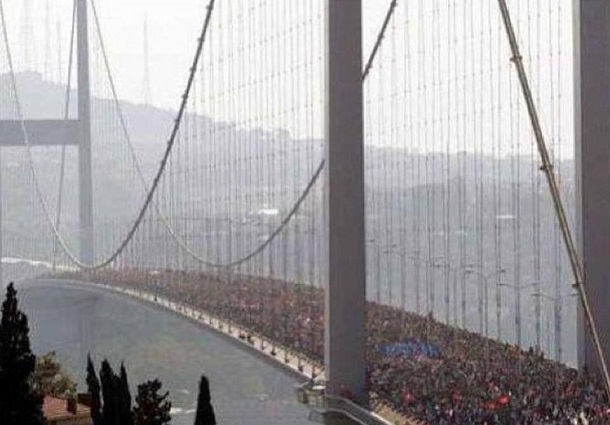
The police effort to clear protesters appeared to backfire on Friday, drawing statements of condemnation from rights groups and the European Union and prompting smaller protests in the capital Ankara and the Aegean city of Izmir.
Friday’s public outcry follows a series of events that have fed popular resentment of the government including street-fighting between unions and police on May Day, a restriction on alcohol sales that secularist Turks say amounts to social engineering, the government’s stance on neighboring Syria and grand urban planning projects in Istanbul such as a new airport and a new bridge over the Bosporus that environmentalist say will uproot thousands of trees.
“I’ve been in the protests since yesterday afternoon, it has been a long couple of days for us. Now we’re protesting not because of some trees, but because we’re sick of this oppression and this police brutality against people,” said Emrah Kara, a 31-year-old musician and producer in Istanbul, who wore a mask to protect against tear-gas.
Government critics were quick to draw comparisons to the protests in Cairo’s Tahrir Square that toppled Egypt’s longtime President Hosni Mubarak in 2011. Yet analysts cautioned that while there are similarities in how opposition to government policies has forged a broad coalition of different interest groups, the Turkish protests weren’t seeking to overthrow the Turkish system of government.
“The movement in Tahrir targeted removal of the regime, whereas the reaction in Turkey is against the government’s ruling method. The similarity is the sense of self-empowerment. Until today, ruling as it wished didn’t have any consequences for the government because it kept thinking it can override the opposition, but these protests might be a turning point,” said Sinan Ulgen, a former Turkish diplomat now with the Carnegie Endowment for International Peace.
To be sure, Mr. Erdogan’s ruling AKP with roots in Islamists politics, still retains strong public support. The prime minister won the latest of his three election victories in 2011 after delivering strong economic growth and political stability. Mr. Erdogan brooks little dissent and has made no secret of his ambition to run for Turkey’s presidency in elections next year, when his term as prime minister ends, to the dismay of the political opposition.
Striking a note of contrition on Friday, Interior Minister Muammer Guler said officials would look into allegations that the police had used disproportionate force on the protesters, while still defending the authorities’ right to intervene.
Late Friday afternoon, an administrative court in Istanbul issued a ruling to halt the construction at the park that had triggered the protests. The move is a big, if temporary, victory for the demonstrators. A group seeking to prevent the park’s demolition had sued to overturn a decision that allowed the park to be razed for the reconstruction of an Ottoman-era barracks. The court’s Friday ruling follows two decisions at the Culture Ministry, where a high council supported by Mr. Erdogan had overturned a lower council block on the reconstruction of the barracks.
Speaking in televised comments as protests ramped up, Istanbul Governor Huseyin Avni Mutlu denied that the city’s projects were harming the environment and blamed provocateurs he didn’t identify for using the Gezi Park to agitate Istanbul citizens. Authorities detained at least 63 people in connection with the unrest, Mr. Mutlu said.
As recently as Wednesday, when the protests started gathering steam, Mr. Erdogan had said the government will press ahead with the project.
“They can do what they want. We’ve made our decision and we will do as we have decided,” Mr. Erdogan said, as he cut the ribbon to start construction on the third Bosporus bridge, another controversial landmark infrastructure project ushered in by his ruling AKP.
But the premier’s remarks didn’t stop the protesters. Energized by the court decision that for now halts Mr. Erdogan’s designs for the park, thousands chanted for the prime minister to resign late into Friday evening in Taksim’s main pedestrian thoroughfare, Istiklal Caddesi, or Freedom Avenue.
“With this court decision, they cannot at the moment continue with this project to build a mall in our park. This is important, because the prime minister was saying, ‘We decided, it will be done,’ but the ruling shows that he has no legal basis for the things he is doing,” said Osman Kavala, an activist and member of the Taksim Platform, which has been fighting to keep the park intact.
United States has warned AKP Government Turkey
In Washington, State Department spokeswoman Jen Psaki said the U.S. was concerned about the number of people injured as police dispersed protesters.
“We believe that Turkey’s long-term stability, security and prosperity is best guaranteed by upholding the fundamental freedoms of expression, assembly and association, which is what it seems these individuals were doing,” she told reporters. “These freedoms are crucial to any healthy democracy.”
Psaki said the U.S. was still gathering information about the incident.
There was very little coverage of the protests on television channels in Turkey, reflecting the environment of self-censorship by the media, which has, among other things, been pressured into dismissing staff too critical of the government.


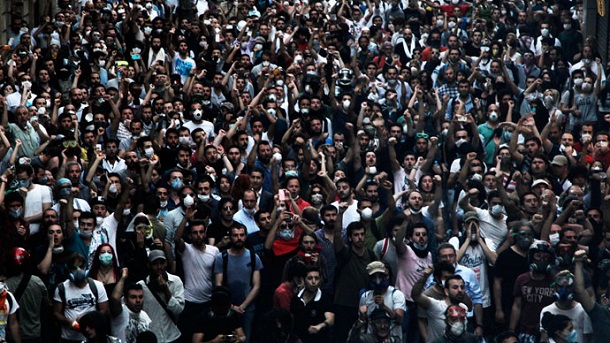
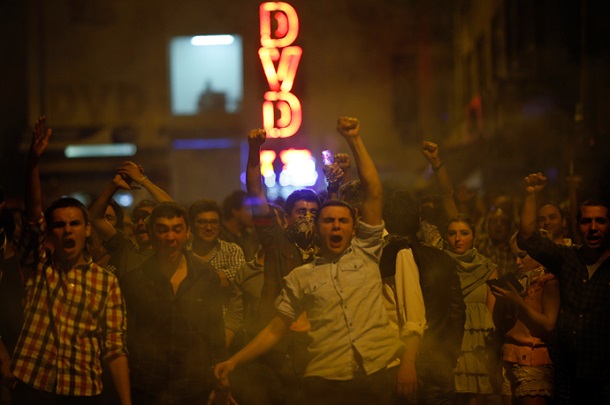
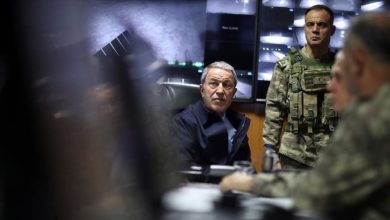

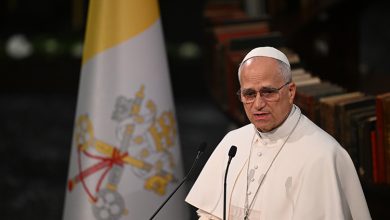
What a beautiful scene on the bridge…CNN reported hundreds of people but I would say from the picture thousands of people. Not sure why international media is dimming the subject matter.
Anyway, save every piece of your land.